School named for California poet Juan Felipe Herrera opens in Fresno. ‘It means everything’
When Juan Felipe Herrera addressed Myisha Lea’ea’s fourth-grade class on the first day that the southeast Fresno elementary school that bears his name opened its doors, he delivered a five-word “magic message” for the students: “You have a beautiful voice.”
The U.S. Poet Laureate emeritus wants the students to take the message to heart, and to believe it is true from now on. That’s because his elementary school experience was not so positive.
However, his third-grade teacher planted that seed that his voice mattered and that it was beautiful. Herrera, who was born in Fowler, has been passing on that message as he became a poet, writer, teacher and activist.
Herrera reminisced with Vida en el Valle about his elementary school escapades, having a school named after him, his hopes for the future students attending Juan Felipe Herrera Elementary school, and other life issues.
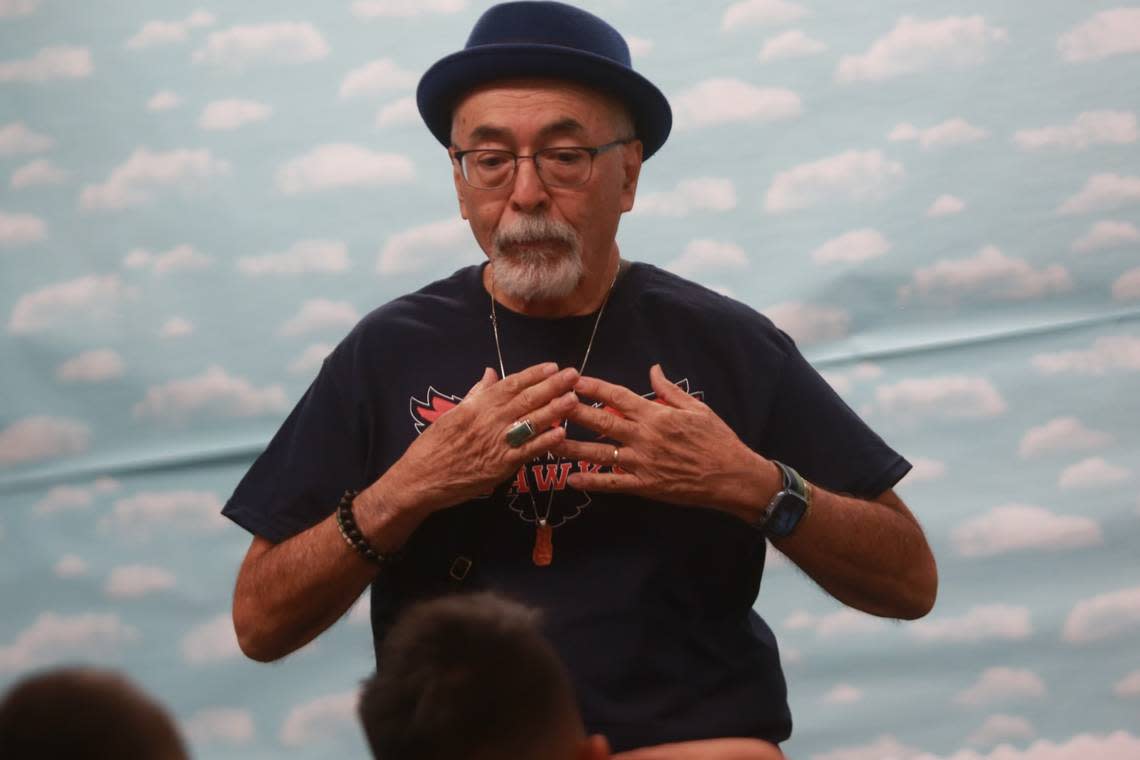
Q: What do you remember about your first day of school?
A: “My first day of school was an unknown factor. My father dropped me off in his army truck in Escondido, California, and no one knew where the school was or what it was or what it looked like. But my father found it and then he just opened the door, and he goes, ‘there it is.’
“And I go, ‘where?’
“He says, ‘Over there. OK, so I’ll see you later.’
“Y se acabó. I didn’t know what it was. It was a big old building and I go, ‘I guess that’s it.’
“He said, ‘It’s over there.’
“And then it had a door, and I opened the door. And I saw a big old hallway. I go, ‘what do I do now?’ I don’t even know what this is. And I just said, ‘I’ll choose the first door to my right.’ And that was half of the first experience.
“The other half was that I was late. The teacher was all huddled up with a little group of students. I suppose it was first grade. And I didn’t know what was going on. And I must have blurted something out in Spanish. I was just late, you know, good old 100% late and looking lost. And then she brought me over to where she was, and she had me lean on her lap and spanked me.
“That was my first experience, the very first thing was to be spanked in class in front of everybody, because I didn’t know what’s going on.
“It was a little traumatizing. And, you know, I cried, and it was a terrible day. Anyway, we made it back home later and I kept it a secret and it wasn’t a good thing to do. And now I looked back I could have just got it out of my system. But I didn’t know how to do any of that either. So, I just took it in. And that was it. That was my first experience.”
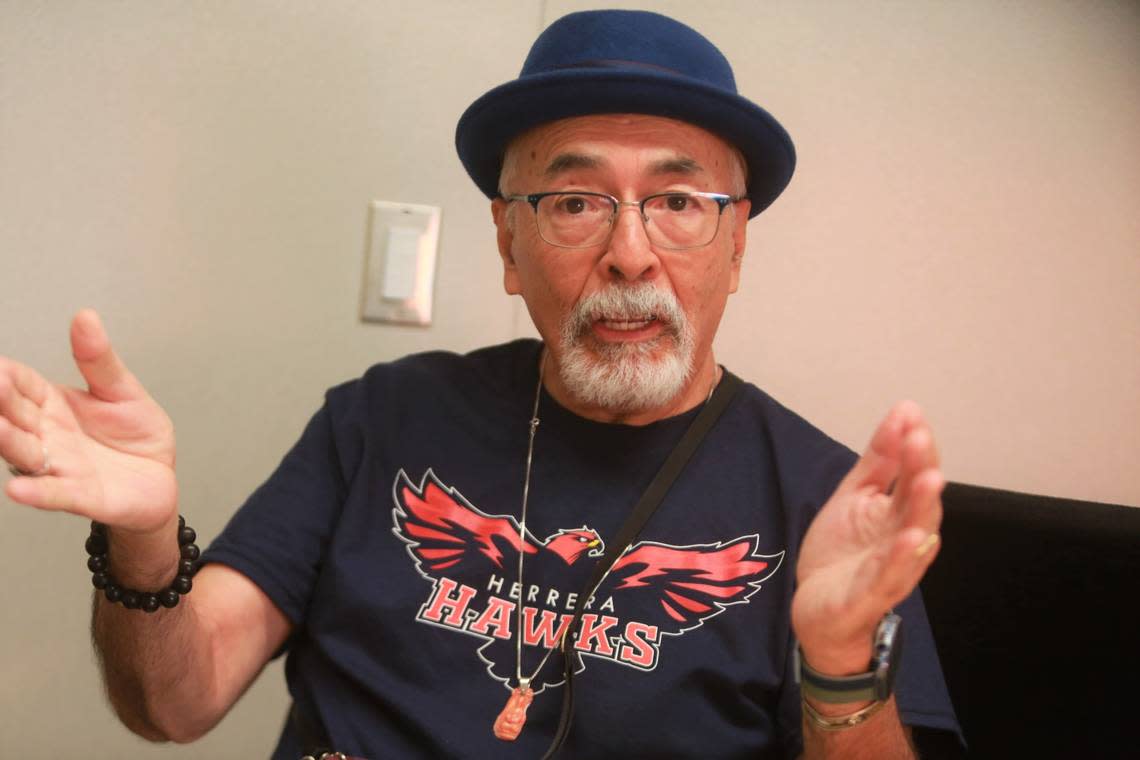
Q: What was your favorite class in elementary school?
A: “It was third grade. This was in Logan Heights, San Diego, a segregated barrio. And I had been going to Burbank Elementary, almost at the end of the barrio. And the principal came over to see me and said ‘Oh, you’re in the wrong school.’ I’d been there already in second grade. “You’re in the wrong school because you don’t live in this area anymore. You live further up Logan.’
“My father always moved, no matter where we were, we’re like grasshoppers pa’ya pa’ca, pa’ya pa’ca. He always said you move new ideas. He was right. So, we were at another location in Logan Heights at the beginning of the opposite end. So, the principal dropped me off at Lowell Elementary, it was an old army barracks next to a junkyard.
“So, there I was in Mrs. Sampson’s class. She was an African American teacher, and she played gospel with an old phonograph in the class. And went on to say, ‘John, why don’t you come up in front of class? Please come up. Come up. I’m right here next to you.’ I walked to the front of the class. I turned around, looked at the students and sang a song.
“Imagine going from being spanked, becoming silent. And second grade was just as brutal. Students went with nosebleeds into the cloakroom, that’s what we got sent if we messed up, too much talking, whatever it was, we ended up in a cloakroom. I’ve been here once or twice, but some people had their bloody noses bleed out in the cloakroom.
“In third grade we sang songs. We sang gospel songs. So, I sang ‘Three Blind Mice, Three Blind Mice,’ and I made it all through the song and then she turns to me and goes, ‘you have a beautiful voice.’
“That just blew me to pieces. I didn’t really know what she meant. I didn’t want to accept it. You’re told that you’re beautiful. There’s a little tension, given my experience. So, then I went to sit down in the back room. Beautiful voice. I don’t have a beautiful voice. Beautiful voice. So, this became my lifelong puzzle and golden key. So little by little, I opened up that puzzle where I began to solve it little by little.”
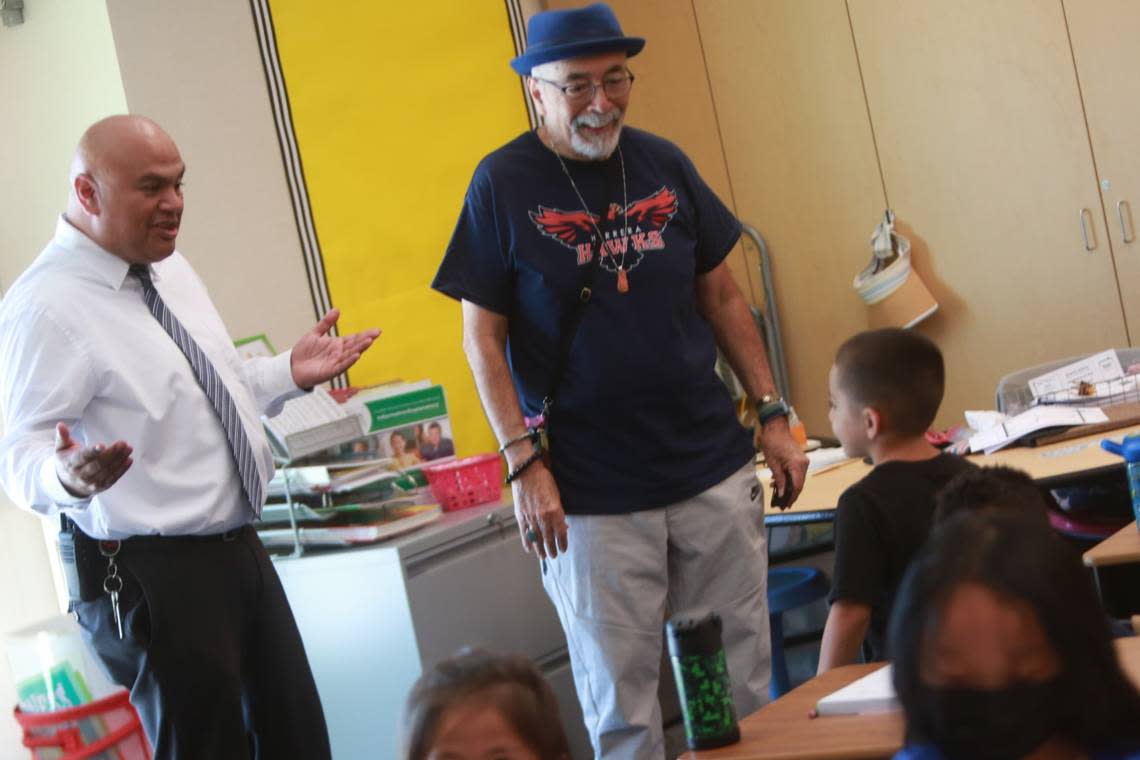
Q: Tell us about a point in your life as a student that changed you.
A: “And it really happened in seventh grade. Good teachers. It sounds great. I was in music class. This was on the northside of San Diego. Because we moved again. So, Mr. Schuester, I just loved all the music he presented, the symphonies, Mozart, Beethoven, Sibelius, Mendelssohn, on and on, all the instruments. It was amazing for me, but one day he said, ‘what are you?’
“What am I? Oh God. I wasn’t going to say Mexican. That was a big problem. I had gone through that a lot. You know we were campesinos, my father showing up to pick me up with a big old giant sombrero. I was just caught up in all that. It was difficult.
“So, I said this is just as bad as third grade. So, I said, ‘I am. I’m Hawaiian.’ But that’s where everything changed. Because I realized I wasn’t telling the truth. I realized I was totally nervous and filled with anxiety. I noticed I was just uneasy. I wasn’t telling the truth. I wasn’t Hawaiian. I was Mexican.
“I had wanted to play the saxophone. Mr. Schuester had invited me to be in band the next semester. And not everybody gets invited. I wanted to be in the band. I put $5 down on the saxophone in a pawn shop for a $200 saxophone.
“I said, ‘I’m not going to take band; I’m not going to follow that dream of that saxophone. I’m going to be in the class that I don’t want to be but the one that’s going to crack me open. So, there will be no question expressing myself and telling the truth. By the time I’m done with that class I’ll be able to do it, to tell the truth, speak up, no longer be filled with nervousness.’ And that class was choir. That was Dr. Rossi.
“We had to sing solos and then we had to perform, get on stage and that’s where the magic began to take place. I go, it feels good to be with 50 singers singing at the same time. And being on the stage is kind of exciting. And being in front of an audience. It’s amazing. It’s difficult, but it’s amazing. All a sudden my life started to be painted in front of me without even knowing it.
“But the tough part, long story (I’m such a blabbermouth), was that the singing brought me out, as difficult as it was year after year from middle school to high school to the very end when I was a senior. But it began to loosen me up.
“So that’s the pathway as part of my pathway. So, Mrs. Samson’s phrase “you have a beautiful voice” was something I worked on so I could tell the truth, not be nervous, express myself, value my voice, value myself. And the most important part was telling the same phrase to others.”
“So, when I went in front of audiences, in front of children, in front of the classroom, I said I want everyone to know that you have a beautiful voice. You, each one of you. So that was a cycle. That’s what happened after many years. And I still do that. And that’s why I’m so happy to be here at the school. Because this is what I’m going to tell every child in every classroom and it’s so important because we are our voice. That’s who we really are.
“And it is a voice that has kindness and tenderness and compassion and with that voice all the trouble in the whole world will connect if we all get in touch with our voice, with who we are and pour out our compassion and kindness to the people and then violence and clashing and hating by the words will dissolve if we all follow our voice, our compassionate voice.”
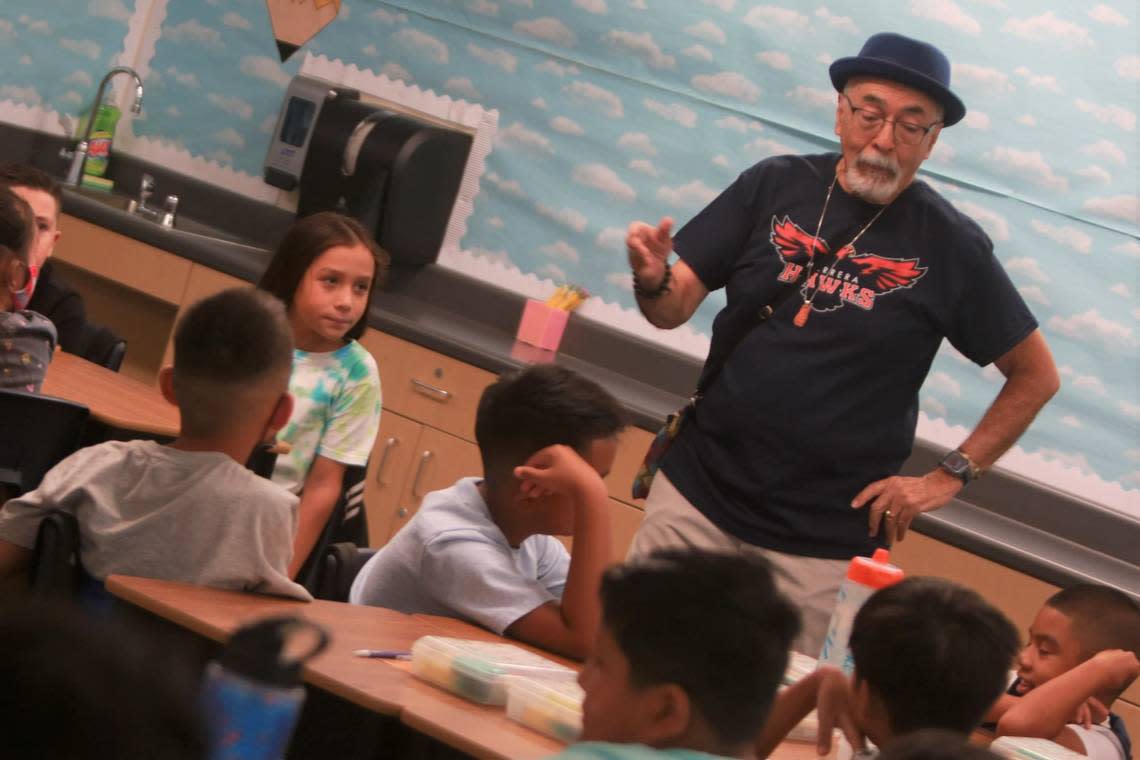
Q: What are your hopes for students at Juan Felipe Herrera Elementary?
A: “I hope for happiness for those students, and I hope for a deep sense of belonging here, and I hope they have friendship. They discover friendship, the care of their teachers. Their teachers have been getting their classrooms together for I don’t know how many days or just been so excited.
“So, I hope they find a love for learning and for themselves like me. You know, that they have a beautiful voice, and they begin to be happy about who they are, and they get excited about going to class and they get curious about what they’re learning, and they love their little plot.
“Each class is going to have a little garden, that they get excited about the garden and about the earth. And that they get excited about outer space of all things. So about themselves, about each other, about their class, about what they’re learning about the Earth, and about that larger thing called the universe.
“The reason I add that in it’s because I’m also excited about it. Recently, NASA invited me, as you know, to write a poem for the Lucy Mission spacecraft — they call it the uncrewed robotic interplanetary spacecraft — a poem which is going to be read too many years from now.”
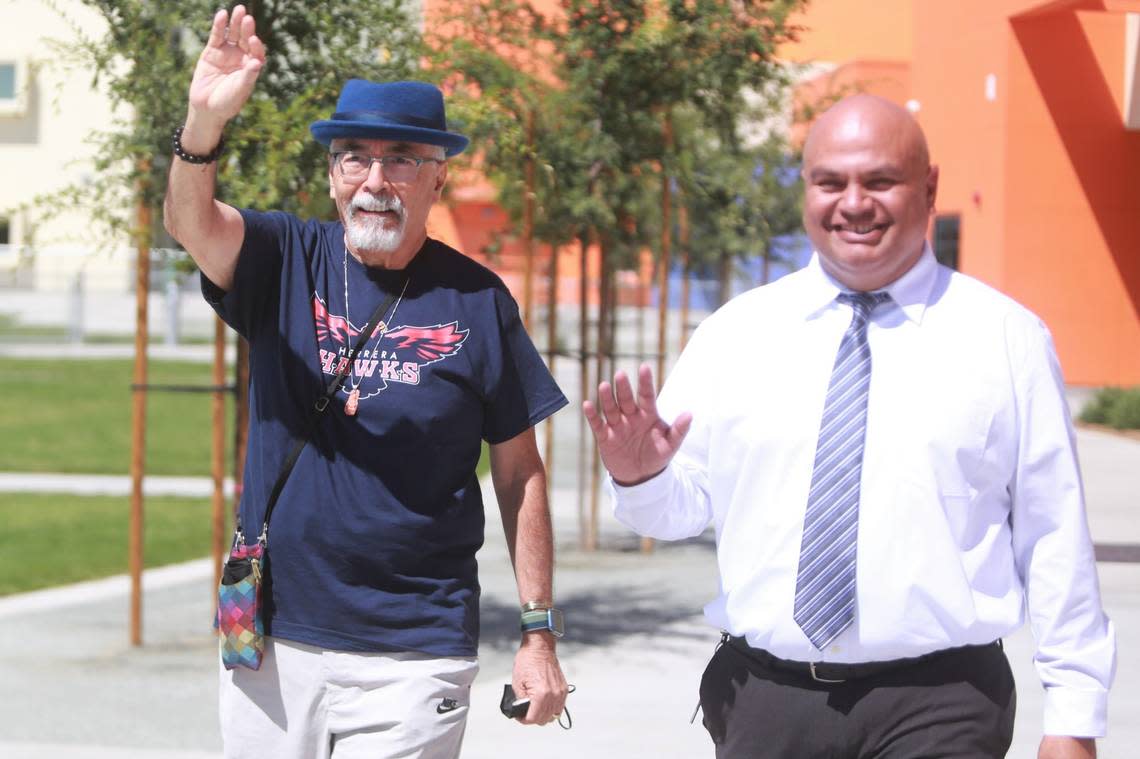
Q: What does it mean to you to have a school named after you?
A: “It means a lot. It means everything. I imagine it means my whole life. It means the life of my mother, her whole life, since she was a girl, a kid. She grew up in Tepito in a barrio called El Niño Perdido (in México City). This is way back in 1905.
“Her school experience was living in an orfanato in México City, because no one had any money or food to feed their children during the Mexican Revolution. So, the best my grandmother could do was to put her in an orphanage. She didn’t have any real schooling. She loved to learn.
“So, she never stopped teaching me. She was always teaching me. All that teaching and collecting materials and little, tiny books and scraps of books was my mother’s approach to making sure I was learning throughout our lives together.
“And my father, I don’t know how he ever learned how to read or write; and, write so well. He never went to school. So, my father learned English words, vocabulary by paying a penny per word. And in those years, 10 cents te comprabas (would buy you) a pair of pants.
“It means a lot because (Juan Felipe Herrera Elementary School) represents my father’s and mother’s and abuelos’ lives and all our lives, not just mine and my family, all our lives. How we had to dig and find the struggle and save a few pesos or pennies to get whatever we could for our children and teach them and learn in whatever way we figured out how to learn because we all had to do it with our bare hands. We learned everything con las manos.
“People say, well, how did you learn how to write? Con las manos. I didn’t take any English, any, you know, creative writing classes. I didn’t take any portrait classes.
“I was always listening, always learning, just like I was when I was a kid.
“So this means a lot, because the teachers are totally great and bilingual teachers, and this is an amazing school. It has all the facilities, all the materials, all the resources, the library con todos los libros (with all the books), and the children are just starting out.
“So, my mother would be very happy. She probably wanted to come to take a class and my father would like to walk around. He would walk around here in the fields over there because he grew up in the fields and he probably wanted to play his harmonica. Learning was so important. They did it all on their own and that’s how they did it.
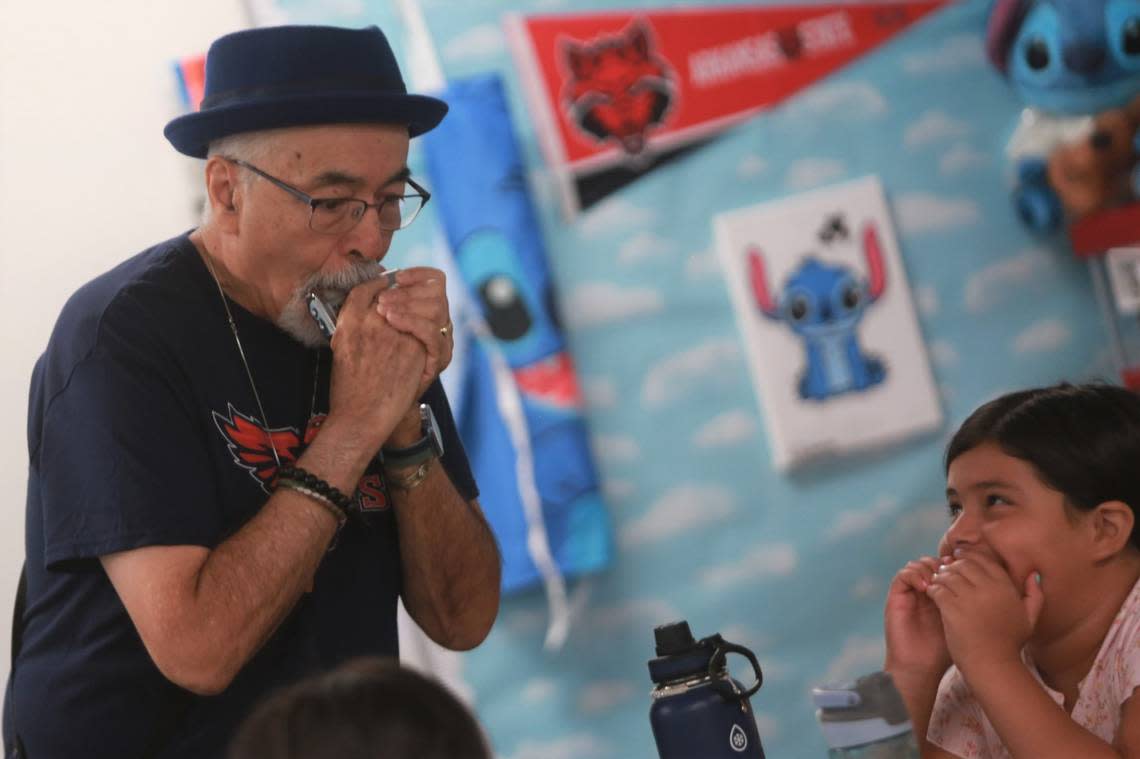
Q: What book are you currently reading?
“‘Parrot in the Oven’ by Víctor Martínez. The 1996 winner of the National Book Award, one of the highest honors a writer can get, and Víctor was the first Chicano to receive it.
“A couple of years ago, Elizabeth Acevedo won the same award with her ‘Poet X’ young adult novel in verse. Victor’s was a Young Adult Novel too. More recent was Martín Espada’s ‘Floaters,’ a poetry collection.
“‘Parrot in the Oven’ was the first. Víctor was from Fresno and went to Fresno State and Stanford, for his writing. He rarely received mentions other than his sudden fame with ‘Parrot.’ It was translated into a number of world languages in Europe and Japan. It’s a familia story, a tough one and a great one, a farmworker one. I recently began to read it again. Such a beautiful friend, died from lung cancer in 2011, in San Francisco, where we lived in the 80s. He was just getting his work published.”
Q: Are you a cook? What is your favorite dish to make?
A: “I do have favorite dishes, that would be enchiladas. I think the furthest I can get in making enchiladas is getting the chilies from Nuevo México, which I can easily get because I have familia there. And they can send me a big old bolsas de chiles, chile colorado seco. And they can also send the (chile) verde, but that you have to roast it. It smells fabulous, which is a whole other way but it’s not for enchiladas.
“So, the enchilada sauce, I think I can make enchilada sauce with those particular chilies. But put the tortillas and know which kind of tortillas and the pan and el aceite, un poquito aceite (little oil). And then put it all together con el queso (cheese). That’s the one I would like to know how to really make a successful enchilada, but I know how to make the chili sauce. That’s how I see it.
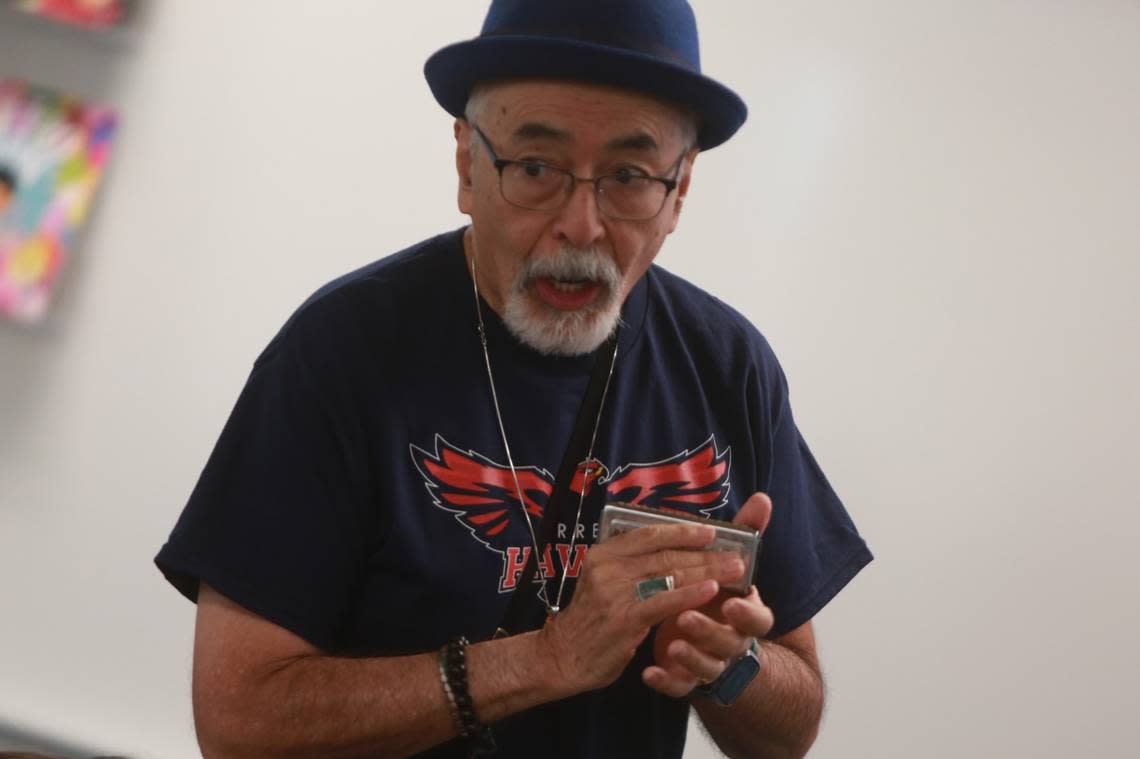
Q: How did you meet your wife? Was it love at first sight?
A: “It was curiosity at first sight. You’re going to like this. We met at juvenile hall. We were both giving poetry workshops in San José, California at juvenile hall.
“I was doing a workshop over here and she was doing a workshop over there. And I happened to turn around like this and she was wearing white, and she was walking out this way. And I go, ‘who is that?’ And that was it. I mean, that was Part I.
“I noticed her, but it was over when she walked out the door because I didn’t know who she was or how to get in touch with her.
“But then a friend of mine, Lorena de Cervantes — who was a poet and had this programita of doing readings for the youth in juvenile hall — said, ‘Why don’t you come to the Cinco de Mayo reading at the park here in San José.
“And one of my friends, George Barlow, was there. He goes, ‘Juan, before you go,’ as I was leaving already, I was done, ‘Hold on, before you go. Margarita told me to give you this piece of paper.’
“Margarita? Oh, you mean the one that was doing the workshop?’
“It was a phone number. So, I had the choice, the existential choice of calling her or not calling. So, I called her. She goes, why don’t you come — she had a poetry group — to our poetry. We’re going to do a little filming and videotaping. Can you do a workshop for us?’
“Yeah, OK. I can do a workshop for you guys. So where are you meeting? Are you going to have the video cabinet? OK. And what time? Ten. I’ll be there at ten.
“She was staring at me while I was doing the video. She was looking at me, you know, I’m trying to do a little video thing. So anyway, it started right there. That’s where it all started to happen. ¡Hay que pregunta!”
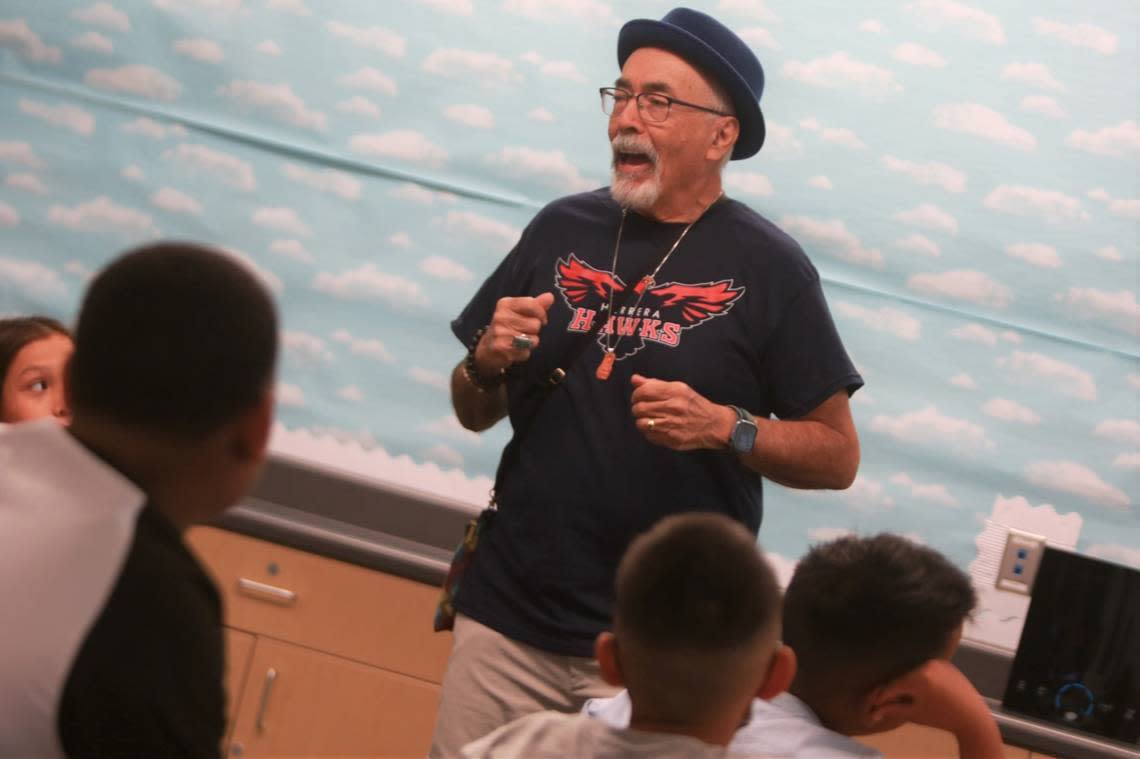
Q: How easily did you adapt to social media?
A: “Fijate, to this very moment I don’t even know what Instagram is for. I mean, I have stuff on Instagram, but I don’t get it. What’s the difference between that and Facebook? It’s a different way of putting photos together. But no le saco nada. (I don’t get anything out of it). I mean, I put photos up on Facebook. People comment on them and then I have some photos up on Instagram, but only did it like once or twice. I don’t think anybody made any comments on it. Y se acabó. So, I don’t get it.
“Twitter? I am on Twitter too. Pero, kind of funny little statements, you know, tampoco le saco mucho, you know. OK, see, what would it be? I just respond. I’m more of a person that responds to something that’s up. You know what? There’s always somebody that puts up the very same thing every time, every day. And I think it’s a line from one of my poems every day for the last, I don’t know, two years, somebody posts a line from one of my poems and that’s it, the same line every day on Twitter for the last two years.
“No se que es. Good luck, you know, and the rest I just respond. You know, ‘Hey, great.” You know, ‘Keep it up. Congratulations.’ And that’s about it. That’s about as far as I get on Twitter.
“I’ll say positive things on Facebook because, you know, something happens, like Uvalde (Texas), I’ll put something in that’s positive and reinforce it. Difficult things like that or terrible things like that, and I like to get into Facebook and support that, write a poem for the children and teachers of Uvalde and the family. That’s what I do with Facebook.
“I understand it but I’m more, more involved in society on the ground than on digital society.”
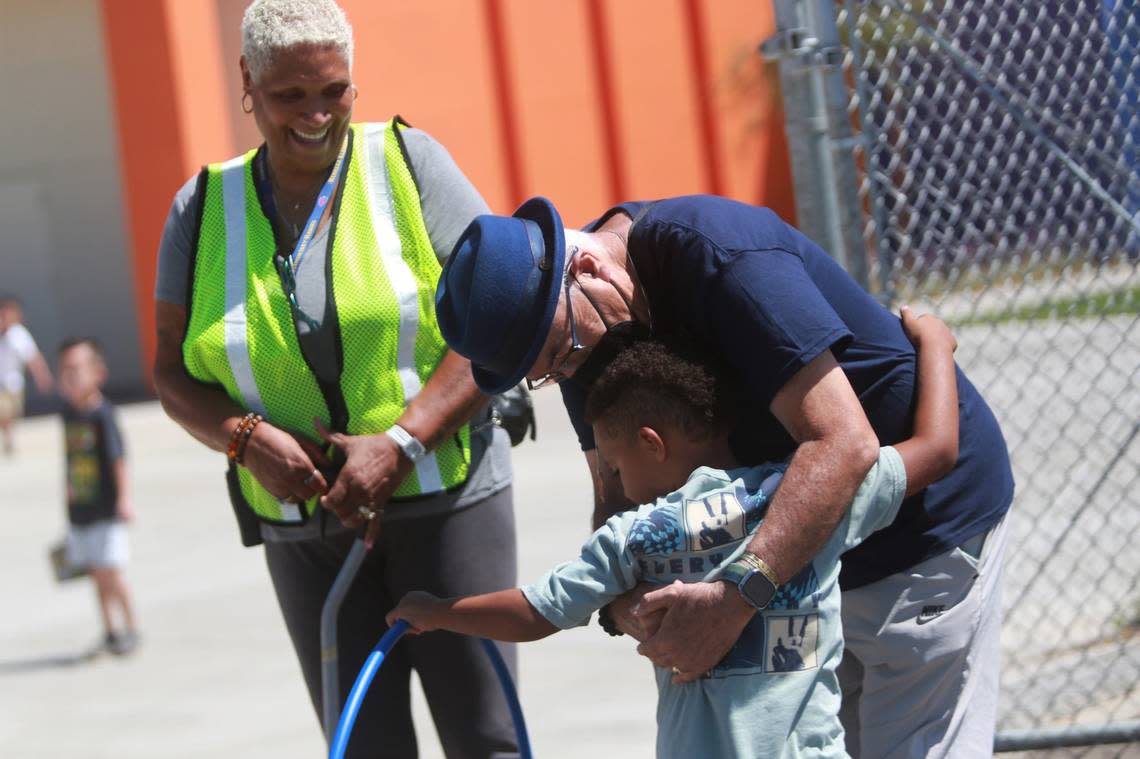
Q: How were you notified that you’d been selected as U.S. Poet Laureate?
A: “It’s a lightning bolt, you get a phone call and that’s how it happens. ‘Juan, can you be at your desk on the 22nd of February at 1:30? You’re going to get a phone call.’ This is like a month before.
“I kind of felt it was something like that, but I really didn’t know. And if I had a little inkling, no quería creerlo (didn’t want to believe it). It was like, you have a beautiful voice. I didn’t want to believe it. I didn’t know what it was.
“And it rings at that time on the 22nd. And I picked up the phone and it goes ‘Oh, is this Juan Felipe Herrera?’
“Yes, this is Juan Felipe.”
“Oh, will you hold on, please?’
“Yes, Mr. Herrera, this is Dr. James Billington from the Library of Congress, the head librarian. Well, you know, we’ve been talking about your writing, and we really, really, really value what you’ve been doing. As a matter of fact, we think it’s very important. We really think highly of you. Let me get to the point here, Juan. Would you consider being the 21st poet laureate in the United States?’
“Yes, Dr. Billington.
‘We’re very happy to know that you would like to do this. We’ll be calling you soon and we’ll get all the details to you.’ Please don’t tell anybody. The press release is going to go out the 6th of June 2015.’
So that’s how it goes. You won’t believe what happened. June 6th came, and the word went out like firecrackers. So, I had a whole line around the house, on the street, Univision, Telemundo, L.A. Times, and they would come into the house. So that’s what happened. And the phones were ‘Ding, ding, ding, ding, ding,’ and it was exciting. And then questions and then for the photos. And then the inaugural, a whole other story.
“You know Mr. Sampson called me when I was named poet laureate. We started talking and she came to the opening at the Library of Congress.”
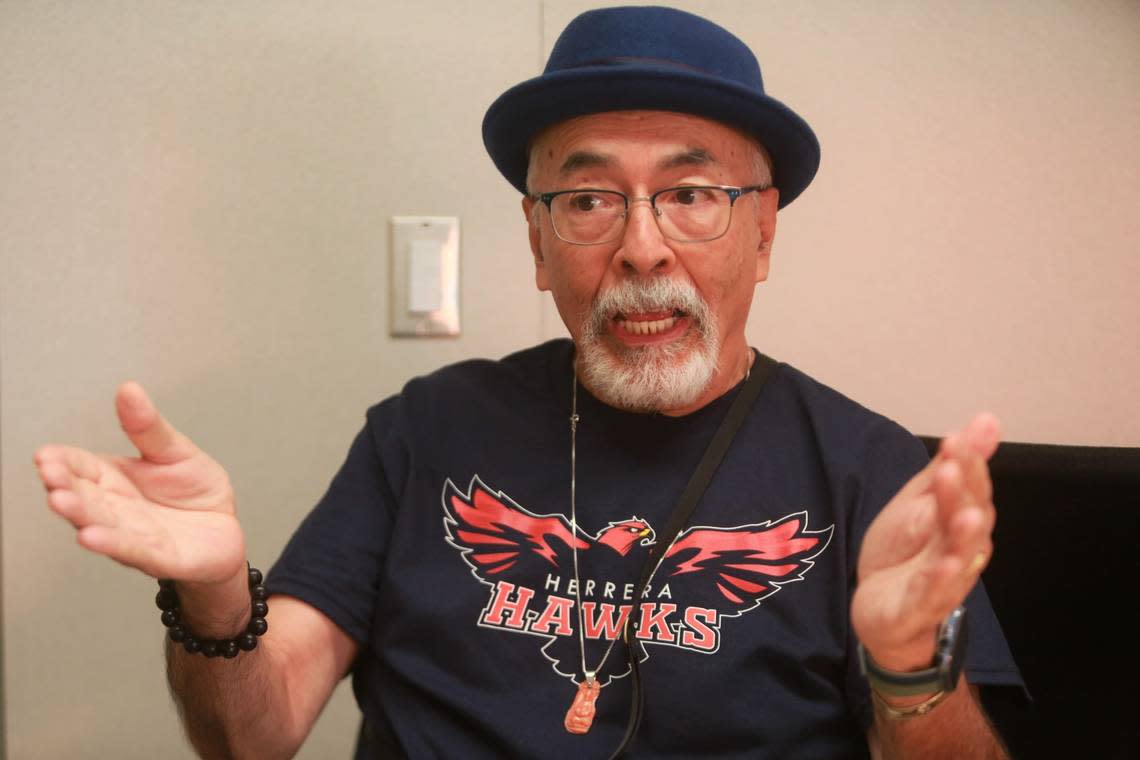
Q: What makes the Valley a fertile place for Latino/Latina authors and poets?
A: “Porque es la capital de la poesía. (It’s the capital of poetry). It is our experience, and of course, the forerunners. You know, it didn’t happen all at once. It’s our experience, campesino experience, workers in the fields, migrants, immigrant experience.
“I think it’s our experience and of course, the social movements around our experience that we were part of. And once again how important our voices are and we discover that we didn’t have paper or typewriters back then or the media, but we had our voice and we had pencils and some kind of papel. And we had each other and we had our families. We had all those stories already and we have had the songs since we were children and the guitars, and cuentos y chistes.
“So, language and vocabulary and songs and melodies and experiences and photographs and journeys and stories and then the social movements of los campesinos, Dolores Huerta, a great speaker and arm twister.
“So, we had all these materials. We had a world of literature already in our hands. All we had to do was write it and apply it to what was taking place.
“And the Valley, let’s get back to that, is rich in those stories and those children and those families and that’s why we have a lot of escritores.
“We also have Philip Levine, the late 50s at Fresno State, who taught a lot of Chicanos and Chicanas. He wanted the real stories. So, people like Víctor Martínez came from Philip Levine’s workshops, Gary Soto, Diana García, all from Levine’s workshops and all of those became powerful writers, influential writers.
“It’s the right place. Como se dice, it’s the right sartén. Es un sartén que calienta y cocina los poetas. (It is a pan that heats and cooks the poets.) Es un sartén literario aquí en el valle.
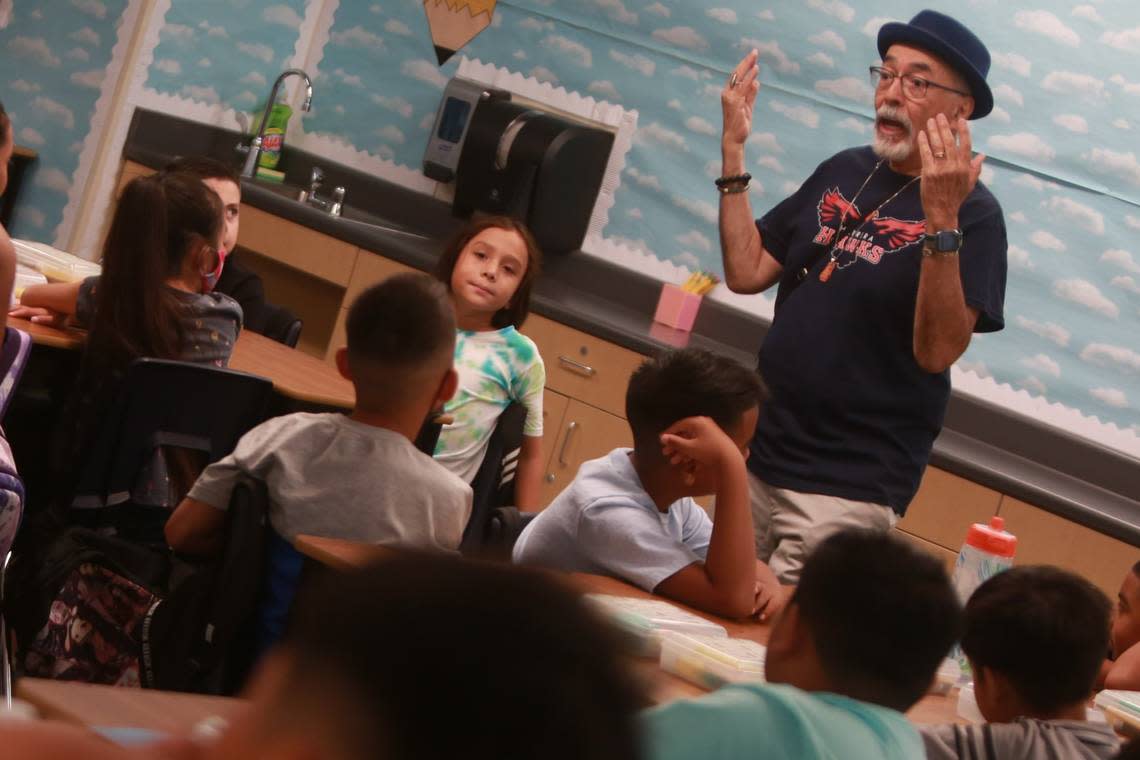
La Abeja, a newsletter written for and by California Latinos
Sign up here to receive our weekly newsletter centered around Latino issues in California.
